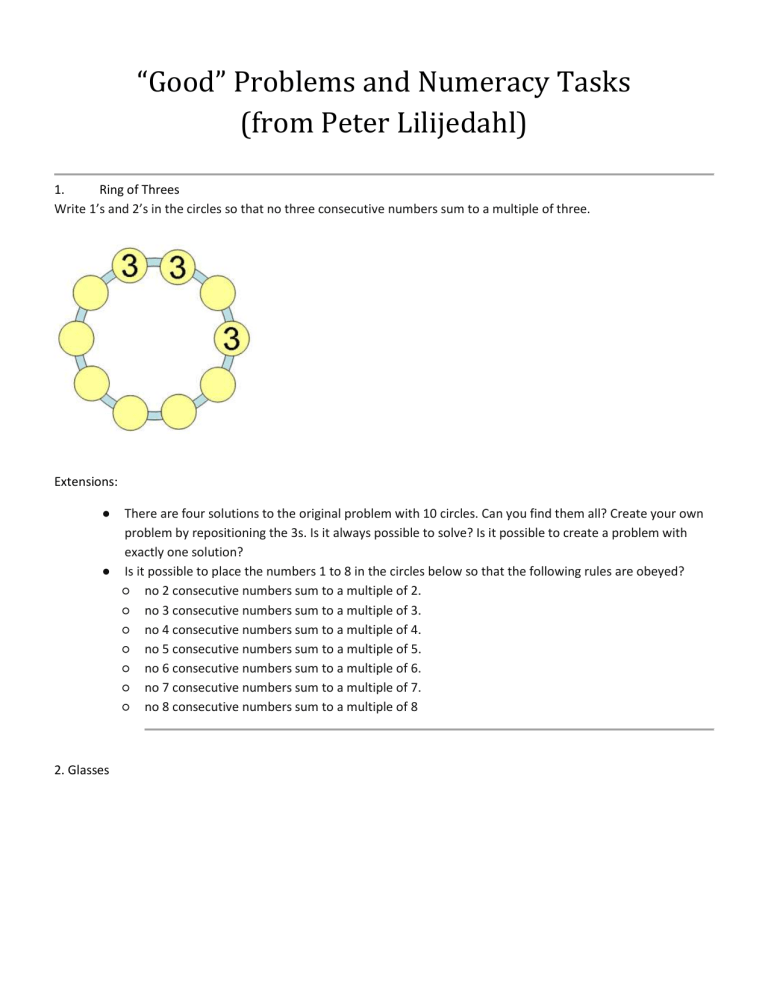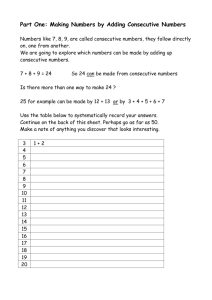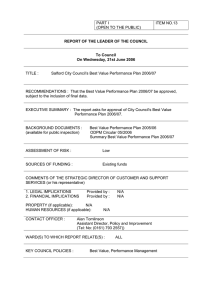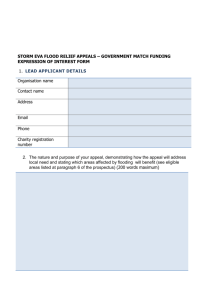
“Good” Problems and Numeracy Tasks (from Peter Lilijedahl) 1. Ring of Threes Write 1’s and 2’s in the circles so that no three consecutive numbers sum to a multiple of three. Extensions: ● There are four solutions to the original problem with 10 circles. Can you find them all? Create your own problem by repositioning the 3s. Is it always possible to solve? Is it possible to create a problem with exactly one solution? ● Is it possible to place the numbers 1 to 8 in the circles below so that the following rules are obeyed? ○ no 2 consecutive numbers sum to a multiple of 2. ○ no 3 consecutive numbers sum to a multiple of 3. ○ no 4 consecutive numbers sum to a multiple of 4. ○ no 5 consecutive numbers sum to a multiple of 5. ○ no 6 consecutive numbers sum to a multiple of 6. ○ no 7 consecutive numbers sum to a multiple of 7. ○ no 8 consecutive numbers sum to a multiple of 8 2. Glasses The taller glass is filled “most” of the way with water. The smaller glass is carefully placed inside the bigger glass. How much water spills over the sides of the taller glass? Extension Which graph represents which part of the problems (bigger glass, smaller glass, water outside glass) 3. 10 Prisoner Release A warden has decided that his jail is too full, so he wants to release some of the prisoners. His strategy for doing this is that he will take ten prisoners at random and line them up in a row so that each prisoner can only see the prisoners in front of them. The warden will then place a black or white hat on the head of each prisoner. Starting at the back of the row the warden will then ask that prisoner what colour his hat is. If he guesses correctly then he is released. The warden then goes to the next prisoner in line, and so on. The ten prisoners are allowed to meet to discuss before they line up. If they are clever they will come up with a strategy that will guarantee to save some of them. How many could you save? 4. Fantastic Four Make the numbers from 1 to 30 using four 4’s and any operations. 5. Integer Operations Demonstration of challenge - list numbers 1 through 10 on the board. Now list 4 operations ÷×+ - and have students choose one to repeat. Figure out the answers. Students challenge - Give them the answers, and they have to figure out the question using the numbers 1 through 10 (no repeats) and the four operations plus they can choose one extra (their choice, can change). Answers to get 17, 2, 21, 3, 2 2, 2, 2, 2, 9 10, 14, 1, 20, 16 3, 3, 3, 3, 24 Extensions - come up with their own, have some negative numbers, etc 6. TERRY FOX FUNDRAISER Last month your principal announced the annual Terry Fox Run and promised to provide a pizza lunch to the most deserving class. There were two ways to raise money for this event: ● Pledges – This form of fundraising required students to go door to door and get written promises (called pledges) from neighbours to donate a certain amount of money per kilometre that the student will run (for example: $1.00 per kilometre). After the run the student needed to go back to these neighbours to collect the money. ● Parent Donations – If students did not want to go to the trouble of seeking pledges they could simply have asked their parents for a donation. These donations had nothing to do with the Run in that they were not based on how far the students ran. The Run was last week, the pledges and donations were collected, and the results were just announced AND for the first time in school history there is a tie … AND not only is it a tie, but it is a three way tie. ● Class A has 24 students and they collected $290 in donations and $20 in pledges. ● Class B has 28 students and they collected $150 in donations and $160 in pledges. ● Class C has 30 students and collected $35 in donations and $275 in pledges. The principal can only afford to give pizza lunch to one class. Which team should get the pizza lunch and why? The principal is an ex-math teacher and is best convinced with mathematical arguments, so explain your decision by giving specific details about how you determined which class is most deserving. 7. THE SCHOOL SCHEDULE I Your school is considering going to a schedule such that you will get every second Friday off. Redesign the current two week schedule to allow for this to happen. Things to keep in mind: · There must be the same number of instructional minutes in the new two week schedule as in any two week period of the old schedule. · Over the course of the year, there must be the same number of instructional minutes for each block. 8. THE SCHOOL SCHEDULE II Your school is considering going to a schedule such that there will be a one week Fall Break. Redesign the current weekly schedule to allow for this to happen. Things to keep in mind: · There must be the same number of instructional minutes in the new year schedule as in the old year schedule. · Over the course of the year, there must be the same number of instructional minutes for each block. 9. Egg timer How do you make a 9 minute egg if all you have is a 4 minute and 7 minute egg timer? 10. Crossing the Bridge Adam, Bob, Clair and Dave are out walking: They come to rickety old wooden bridge. The bridge is weak and only able to carry the weight of two of them at a time. Because they are in a rush and the light is fading they must cross in the minimum time possible and must carry a torch (flashlight,) on each crossing. They only have one torch and it can’t be thrown. Because of their different fitness levels and some minor injuries they can all cross at different speeds. Adam can cross in 1 minute, Bob in 2 minutes, Clair in 5 minutes and Dave in 10 minutes. Adam, the brains of the group thinks for a moment and declares that the crossing can be completed in 17 minutes. There is no trick. How is this done? [from Nigel Coldwell] 11. Seed Numbers Consider two whole numbers (for example 3 & 6). These will be the first two numbers. The third number is the sum of the first two (9). The forth is the sum of the previous two (15), and so on (3, 6, 9, 15, 24, 39, …). What do the first two number have to be such that the fifth number is 100?


